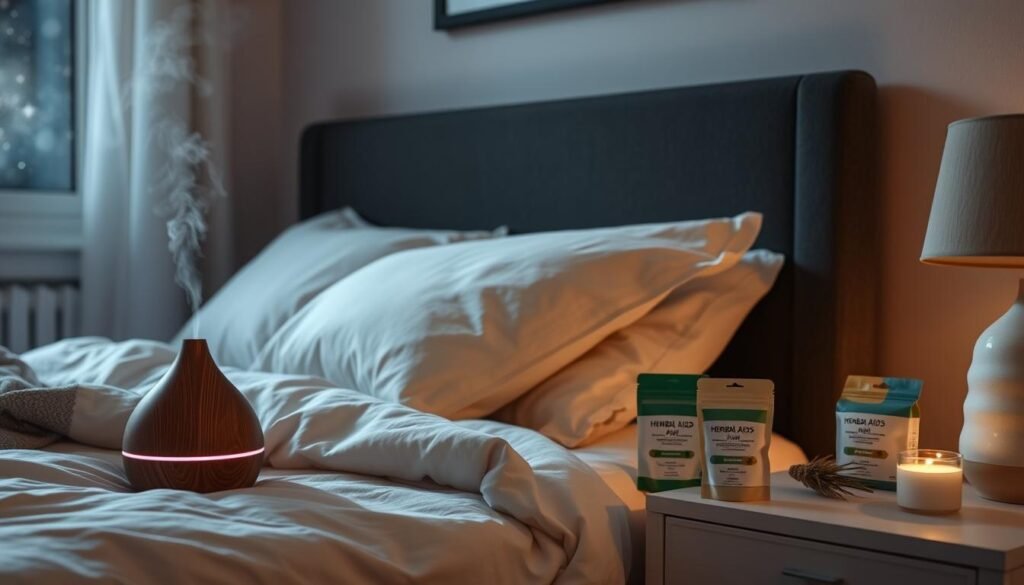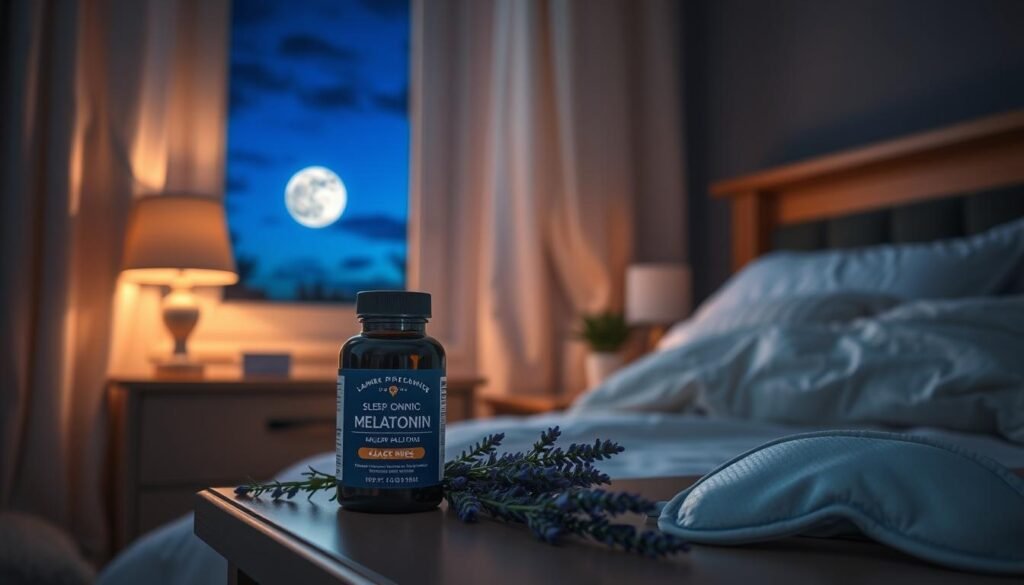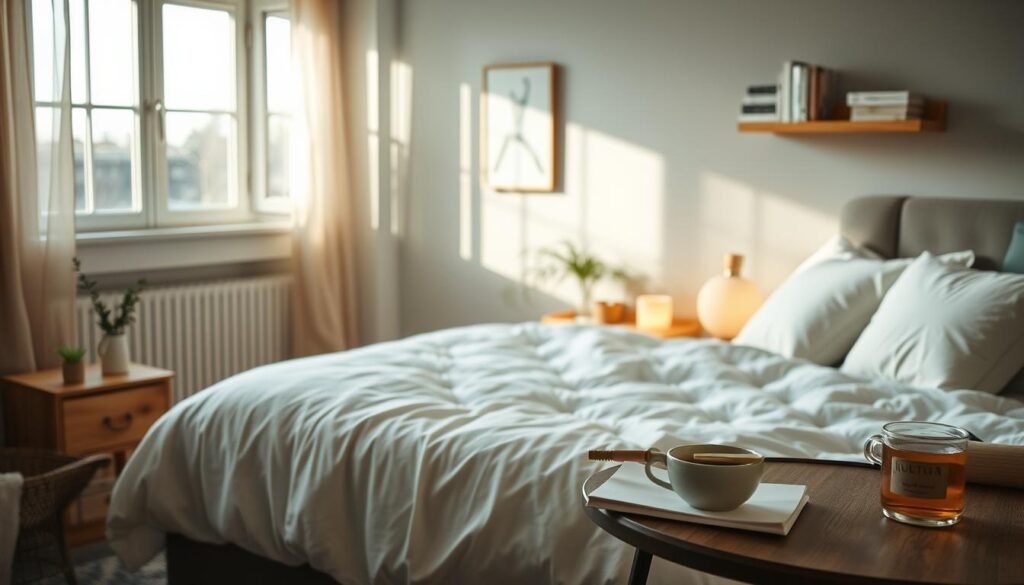Did you know more than 60 million Americans have trouble sleeping? This big number shows we need good solutions fast. Especially for those feeling anxious at night. Sleep anxiety can make you feel restless. This can hurt your mind and body a lot. Problems like bad memory, trouble focusing, and higher chances of diseases like depression, obesity, diabetes, and heart issues can arise. While some choose meds for sleep anxiety, natural remedies are there too. These can make sleep better without the bad side effects of drugs.
Options like melatonin, valerian root, and magnesium help a lot without harming you. This gives hope for calm nights and feeling better overall. Knowing about all types of sleep anxiety treatments is important. It helps get back those precious hours of sleep.
Key Takeaways
- Over 60 million Americans struggle with poor sleep quality.
- Natural remedies like melatonin and valerian root can improve sleep without side effects.
- Poor sleep is associated with serious health issues, including anxiety and depression.
- A variety of natural sleep aids are popular and effective for insomnia treatment.
- Understanding sleep anxiety medication can lead to better sleep quality.
Understanding Sleep Disorders
Sleep disorders are conditions that impact your sleep, harming your overall health and sleep quality. Insomnia is a common problem, making it hard for people to fall or stay asleep. Up to 80% of people may experience temporary insomnia yearly. About 15% suffer from chronic insomnia.
Anxiety, stress, and certain lifestyle habits can lead to these disorders. It’s important to know that factors like these can worsen sleep issues. For example, anxiety or panic disorders are linked to 10% of chronic insomnia cases. This shows the close relationship between mental health and sleep quality.
Finding the right treatment for sleep disorders is crucial. If not treated, they can cause long-term issues. There are many ways to manage them, from medication to behavioral techniques. Sedating antidepressants can help those with both insomnia and depression. Non-drug treatments, like improving sleep habits and relaxation methods, can also improve sleep.
Here are some stats showing how common sleep disorders are:
| Statistic | Percentage/Number |
|---|---|
| Fraction of adults with chronic sleep disorders | More than 50 million |
| Adults reporting insomnia symptoms | About one-third |
| Adults meeting criteria for insomnia disorder | 4-22% |
| High school students achieving adequate sleep | Only 30% |
| Individuals with insomnia also having another mental disorder | 40-50% |
These numbers highlight the need for prompt action on sleep disorders. While drugs like benzodiazepines are often used, it’s important to try non-drug methods first. They can lead to long-lasting sleep improvements. For more on managing anxiety and sleep disorders, check this resource.
The Impact of Sleep Anxiety on Health
Sleep anxiety can greatly harm your health, leading to many long-term issues. About one in three adults suffers from symptoms of clinical insomnia. This often comes with more anxiety and stress, causing sleep troubles. These problems are linked to more psychological distress, higher anxiety, and depression.
Lack of sleep does more than just spoil your mood; it affects your body too. Those with sleep anxiety face a higher risk of obesity, diabetes, and heart diseases. Lack of sleep messes with how your body processes food, making you likely to gain weight. Also, not sleeping enough can lead to serious health problems over time.
The American Academy of Sleep Medicine says adults need 7 to 9 hours of sleep every night. This is to keep both your mind and body healthy. Getting enough sleep helps fight anxiety and keeps you well.
It’s important to understand how sleep anxiety affects your health. Treatments like cognitive behavioral therapy for insomnia (CBT-I) can really help. It deals with the behaviors and thoughts that ruin sleep. By handling sleep anxiety, you can dodge many chronic diseases and feel better.
| Health Risk | Impact of Sleep Anxiety |
|---|---|
| Obesity | Increased risk due to poor sleep disrupting metabolism and eating habits. |
| Diabetes | Sleep deprivation can lead to insulin resistance and elevated blood sugar levels. |
| Heart Disease | Chronic sleep problems elevate blood pressure and stress on the heart. |
| Mental Health Disorders | Heightened levels of anxiety and depression among individuals with sleep issues. |
Common Symptoms of Sleep Anxiety
Understanding the symptoms of sleep anxiety can lead to better sleep. Many find their thoughts racing at night, making sleep hard. This often means tossing and turning, trapped by anxious thoughts.
Waking up often during the night is another sign. It leaves individuals feeling unrested. This can make daylight hours feel too much to handle, causing tiredness and trouble focusing.
Physical signs also show up with sleep anxiety. These include faster heartbeats, tight muscles, and stomach issues. These problems can worsen anxious thoughts about not sleeping. Over time, this may lead to ongoing insomnia, which harms general health.
Knowing these symptoms can help people find the right help. This could be medicine or changes in daily habits to reduce this difficult situation.
| Symptom | Description |
|---|---|
| Racing thoughts | Difficulty quieting the mind at night. |
| Frequent awakenings | Waking up multiple times during the night. |
| Daytime sleepiness | Feeling fatigued and unable to concentrate. |
| Physical symptoms | Increased heart rate and muscle tension. |
Sleep Anxiety Medication: What You Need to Know
Finding the right sleep anxiety medication can significantly impact someone’s life. There are many types, each designed for a certain need. Learning about them helps manage sleep anxiety better.
Types of Sleep Anxiety Medications
Sleep anxiety meds are mainly natural sleep aids and prescription medications. Natural options like melatonin and valerian root have fewer side effects. These options are good for those cautious about prescription drugs.
- Natural Sleep Aids: These supplements are often seen as safer.
- Prescription Medications: Medicines such as benzodiazepines and sedative-hypnotics offer quick relief. However, they could lead to dependence and other serious side effects.
| Type | Examples | Side Effects |
|---|---|---|
| Natural Sleep Aids | Melatonin, Valerian Root, Magnesium | Generally mild; may include nausea or dizziness |
| Prescription Medications | Alprazolam, Lorazepam, Ambien | Drowsiness, dizziness, risk of dependency |
Natural vs. Prescription Medications
Prescription meds offer strong solutions for severe sleep anxiety. Benzodiazepines are for short-term use due to tolerance risk. They can affect learning and memory. It’s important to know these risks.
Talk about all options with healthcare providers. Considering addiction potential with long-term use is key. Finding safe treatment options is crucial.

Benefits of Natural Sleep Aids
Natural sleep aids are getting popular for their many benefits. They are especially good for people who struggle to sleep. These remedies are safer than regular sleep meds, which can cause bad side effects. By choosing natural options, folks can sleep better and avoid the downsides of drugs.
How Natural Remedies Help Sleep
Natural sleep aids like melatonin and valerian root help a lot. Melatonin can make you fall asleep faster and sleep longer. This is great for those who work nights or have odd hours. Valerian root, in doses of 300-600 mg, improves sleep. It’s a top pick among herbal options.
Magnesium calming effects can help you sleep faster. L-Theanine, found in tea, might boost sleep and lower anxiety. This is good news for kids with ADHD.
Reduce Side Effects
Using natural remedies can cut down on bad side effects from sleep meds. Many people wake up feeling groggy or get hooked on prescription drugs. But natural sleep aids usually mean better sleep without addiction worries. Using chamomile tea or warm milk can make bedtime more relaxing. This improves sleep quality without any problems.
Melatonin: A Popular Natural Sleep Supplement
Melatonin is a hormone made in our bodies. It helps control when we sleep and wake up. People with sleep issues often use it. It’s good for treating insomnia and jet lag. Studies show it helps you fall asleep faster and sleep longer.
As we get older, we make less melatonin. Many older people use it to sleep better. You should take 1 to 5 milligrams 30 minutes before bed. It’s important to stick with one brand. This is because melatonin supplements aren’t closely watched by the FDA. You can learn more about this in research on natural supplements for anxiety relief.
Melatonin can help reduce how long it takes to fall asleep. This is especially true for those with insomnia and older adults. It also helps with jet lag by making you more alert and less sleepy during the day. However, it’s not proven to work for everyone, like those with shift work disorder.

Kids with sleeping problems can also benefit from melatonin. But, it’s best to try good bedtime routines first. Melatonin can have side effects. These include dizziness, vivid dreams, and feeling tired during the day. So, it’s important to be careful when using it.
Valerian Root and Its Effects on Sleep
Valerian root has been used since the second century A.D. to help with sleep and anxiety. It is known for its calming effects, which can improve sleep quality. Studies show it can aid those with insomnia, working as well as some prescription drugs.
To make valerian root, it’s crafted to have 0.3% to 0.8% of special acids that calm the mind. People often mix it with hops, lemon balm, and passionflower to make it stronger. This mix can especially aid postmenopausal women in sleeping better.
Valerian root is usually safe, but not for pregnant or nursing women, or kids under three. Side effects can include headaches, dizziness, and upset stomach. Yet, it’s not addictive, making it a good option for those wanting a natural sleep aid.
Valerian root can improve sleep and help you fall asleep faster. For best results, use it for at least two weeks. Always talk to a doctor before starting valerian, especially if you’re taking other medicines. This helps prevent any bad reactions.
The Role of Magnesium in Sleep Quality
Many adults find it hard to sleep, with about 30% suffering from insomnia. Research suggests a link between not having enough magnesium and sleeping problems, including insomnia. Adding magnesium to your daily habits may help improve sleep quality.
Reviewing various small studies, it seems magnesium supplements might boost the body’s melatonin production. This can help older adults fall asleep faster, wake up less at night, and sleep longer. One study found that people taking magnesium, melatonin, and vitamin B complex every day had fewer sleep disturbances.
The National Institutes of Health advises that adult women need 310-320 milligrams (mg) of magnesium daily, while men need 400-420 mg. It’s important to figure out what amount works best for you, as magnesium’s effects can be different for everyone.
- Aging can make it harder for your body to absorb magnesium, leading to more sleep problems.
- Drinking too much alcohol may also lower magnesium levels in your body.
- Taking too much magnesium might cause diarrhea, nausea, and muscle weakness.
Eating foods rich in magnesium could reduce the risk of type 2 diabetes and osteoporosis by making bones stronger. While taking extra magnesium can help those who need more of this mineral, you should be careful. Too much magnesium from supplements can cause issues, so sticking to the recommended amounts is best.
Relaxation Techniques to Combat Sleep Anxiety
Many adults struggle with chronic insomnia due to stress and anxiety. Adding relaxation techniques to your bedtime routine can make a big difference. They help fight sleep anxiety and boost sleep quality.
Start with diaphragmatic breathing. It involves taking slow, deep breaths to lower stress. The 4-7-8 breathing technique also helps by controlling breath speed, helping you feel calmer. Activities like yoga, tai chi, and meditation reduce stress hormones. They make it easier to fall asleep.
Visualization exercises can create a peaceful mind, aiding in sleep. Yoga nidra, a kind of meditative yoga, improves sleep quality too. Progressive muscle relaxation, which includes tensing and relaxing muscles, brings deep relaxation. Doing these exercises regularly for two weeks can have lasting benefits.
It’s key to have a quiet, dark, and cool place to sleep. This reduces night-time disturbances. If you have health issues, talk to a doctor to make sure these relaxations methods are right for you.
Non-sleep deep rest (NSDR) techniques keep you calmly aware, and they have day-time benefits too. With 44% of adults facing stress-related sleep troubles, daily relaxation practices are a strong way to manage sleep anxiety. They also improve sleep quality.
Lifestyle Changes for Better Sleep
Making small changes in your life can improve your sleep a lot. Creating a nice place to sleep is very important. This means making sure your room isn’t too bright, loud, or hot. Turning off lights and keeping the room cool can help you sleep better.
Creating a Sleep-Inducing Environment
A calm bedroom helps you fall asleep easier. It’s smart to avoid bright lights before bed. Think about using thick curtains and sound machines to block noise. A comfy mattress, not too hard or soft, also helps. Following advice from experts on setting up your room can lead to better sleep habits.
Establishing a Sleep Routine
Having a regular sleep schedule tells your brain it’s time for bed. Sleeping and waking up at the same time every day helps a lot. It’s also good to not have caffeine too late in the day. Trying mindfulness or meditation before bed can lower stress. These steps together increase your chances of sleeping well.

Conclusion
Sleep anxiety drugs are key for managing sleep issues caused by anxiety. Anxiety disorders are common among those with sleep problems. That’s why it’s crucial to know and handle these conditions. Treatments like melatonin and valerian root offer natural ways to improve sleep.
It’s important to use sleep anxiety meds wisely. Always talk to a doctor to pick the safest, most helpful option. Making changes in your daily habits can also boost your sleep. Things like exercise and a calm bedtime routine really help.
Talking about the dangers of prescription sleep aids is vital. But, it’s also good to know how useful natural solutions can be. Using these methods can lead to better sleep. They can help you live a healthier, more balanced life.